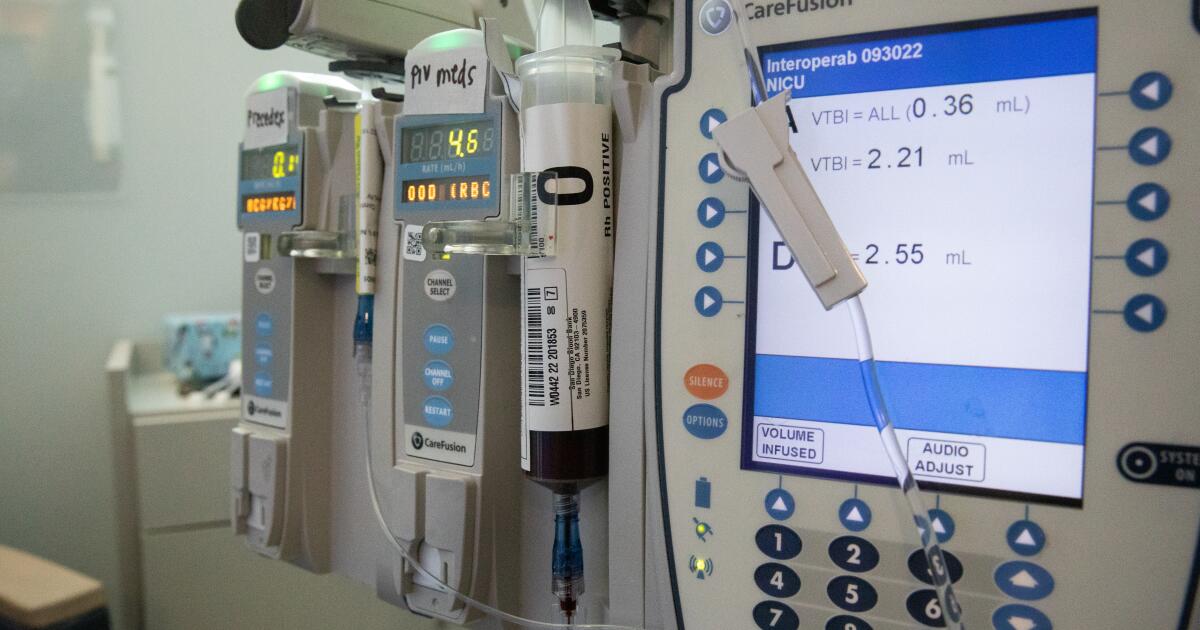Blood
Opinion: Blood donors keep my daughter alive. More donors are needed to support people like her.
Saradpon is a stay-at-home mother of two and a florist. She is president of the Cooley’s Anemia Foundation California chapter, organizes blood drives and fundraisers to raise awareness for thalassemia, and runs a women’s ministry at her church called “Women At The Well.” She lives in National City.
My daughter Kamila is 9 years old and currently obsessed with Pokemon cards. She is a sweet, kind, mature, bubbly kid who loves animals, art, cooking with her dad, the beach and playing outdoors with her little sister. She’s also had more than 164 blood transfusions at Rady Children’s Hospital throughout her life, starting when she was 2 months old.
Kamila has been fortunate to get closely matched donor blood that helps her thrive through a Rady Children’s partnership with San Diego Blood Bank Precision Blood initiative. But in order for kids like Kamila to have a chance at a long, healthy life, we need more people to give blood, especially those who are Asian/Pacific Islander, Black or Hispanic/Latino, so they can formally launch and expand a Precision Blood clinical trial that will directly benefit patients at Rady Children’s.
As a newborn, Kamila was diagnosed with e-beta thalassemia, an inherited blood disorder that limits her body’s ability to make hemoglobin and healthy red blood cells. Neither my husband nor I have this condition, but found out we were carriers when I was pregnant. E-beta is not the most severe form of thalassemia and those who have it may not ever need a blood transfusion except when sick. Scared and unprepared for what was to come, we brought our first child into the world hoping she’d never need a transfusion. Life had other plans. Kamila now needs to spend four- to six-hour days at the hospital for blood transfusions at least every two to three weeks for the rest of her life. Yet she’s here, flourishing and making our lives all the better every single day.
Blood donors of every race, ethnicity and background are the reason our daughter is still alive and thriving today. Without proper treatment, thalassemia can lead to severe anemia, physical weakness, bone deformities, organ failure and even death. But while she is healthy now, it’s a delicate balance, and there is no guarantee that she will continue to do well with transfusions. Because she is so frequently transfused, and because she started receiving blood transfusions so young, she is at high risk for developing antibodies that cause her to reject donor blood and get very sick unless it is a close match.
Kamila’s is AB-positive, making her a “universal recipient” by the current standard of care for blood transfusions — but it’s not that simple. Scientists have found that there are more than 30 blood groups with over 300 antigens that determine a person’s actual blood type, with their racial and ethnic background playing a major role. Kamila is mostly Filipino-American. In an ideal world, we will have a steady pool of Filipino and Asian/Pacific Islander blood donors to have a greater chance of finding the close matches she needs as she gets older and likely to develop adverse reactions to transfusions.
We’re not alone in this dilemma either. Around 20 to 30 kids like Kamila receive blood transfusions at Rady Children’s each month, many of them living with thalassemia, sickle-cell disease or other genetic blood disorders that require frequent transfusions. These kids are overwhelmingly Asian/Pacific Islander, Black or Hispanic/Latino, because people of these racial backgrounds are more prone to several genetic blood diseases. Unfortunately, less than 3 percent of eligible people donate blood. In San Diego, the vast majority of people who do give blood are Caucasian, and we don’t have enough donors of color to keep up a good blood supply for Kamila and all of the other children at Rady who are transfusion-dependent.
We have long been vocal advocates for blood donation, and we were fortunate enough to make contact with San Diego Blood Bank through our advocacy and through Kamila’s treatments at Rady Children’s. Through this personal connection, Kamila has been able to receive blood from donors who are more precisely matched to her exact type, and this has kept her from experiencing the more severe effects of thalassemia that could derail her young life. But in order for Rady Children’s and San Diego Blood Bank to formally expand a clinical trial that could change the lives of more patients like her, we need more blood donors of color.
Before Kamila’s diagnosis, blood donation was not something we ever thought about. But now, our family depends on all those who give blood every day. If you’re a person of color, please consider becoming a blood donor so kids like my daughter can grow up and have the life they deserve.

